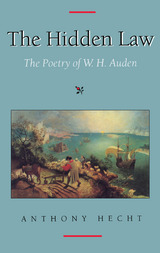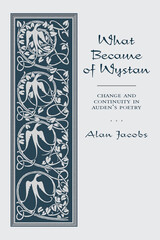
Reviews of this book:
"This is a book about poetry, about a poet who was dedicated to the art like few others of our time, whose poetic technique only another poet as gifted as Hecht could gloss...The richness of reference in this book to history, prosody, theology, poetry, punctuation, makes for a long swim in the heady liquor of poetry--not only Auden's poetry but that of the hundreds of authors whom Auden read...It is a pleasure to read."
"I know of no other instance of a poet of comparable mastery of his art and his experience taking up in such loving detail the work of a predecessor (and near contemporary)."
"The Hidden Law's dispassionate critical voice unfolds a powerful meditation on the vicissitudes of the poetic life...It is at its most significant level a narrative of Anthony Hecht's emergence as a poet, and for all that the book tells us by implication, it takes its place alongside MacNeice's Yeats and Berryman's Crane."
"A work of the most keen-sighted love for the most keen-sighted poet of our century."

A groundbreaking reassessment of W. H. Auden’s early life and poetry, shedding new light on his artistic development as well as on his shifting beliefs about political belonging in interwar England.
From his first poems in 1922 to the publication of his landmark collection On This Island in the mid-1930s, W. H. Auden wrestled with the meaning of Englishness. His early works are prized for their psychological depth, yet Nicholas Jenkins argues that they are political poems as well, illuminating Auden’s intuitions about a key aspect of modern experience: national identity. Two historical forces, in particular, haunted the poet: the catastrophe of World War I and the subsequent “rediscovery” of England’s rural landscapes by artists and intellectuals.
The Island presents a new picture of Auden, the poet and the man, as he explored a genteel, lyrical form of nationalism during these years. His poems reflect on a world in ruins, while cultivating visions of England as a beautiful—if morally compromised—haven. They also reflect aspects of Auden’s personal search for belonging—from his complex relationship with his father, to his quest for literary mentors, to his negotiation of the codes that structured gay life. Yet as Europe veered toward a second immolation, Auden began to realize that poetic myths centered on English identity held little potential. He left the country in 1936 for what became an almost lifelong expatriation, convinced that his role as the voice of Englishness had become an empty one.
Reexamining one of the twentieth century’s most moving and controversial poets, The Island is a fresh account of his early works and a striking parable about the politics of modernism. Auden’s preoccupations with the vicissitudes of war, the trials of love, and the problems of identity are of their time. Yet they still resonate profoundly today.

READERS
Browse our collection.
PUBLISHERS
See BiblioVault's publisher services.
STUDENT SERVICES
Files for college accessibility offices.
UChicago Accessibility Resources
home | accessibility | search | about | contact us
BiblioVault ® 2001 - 2024
The University of Chicago Press









